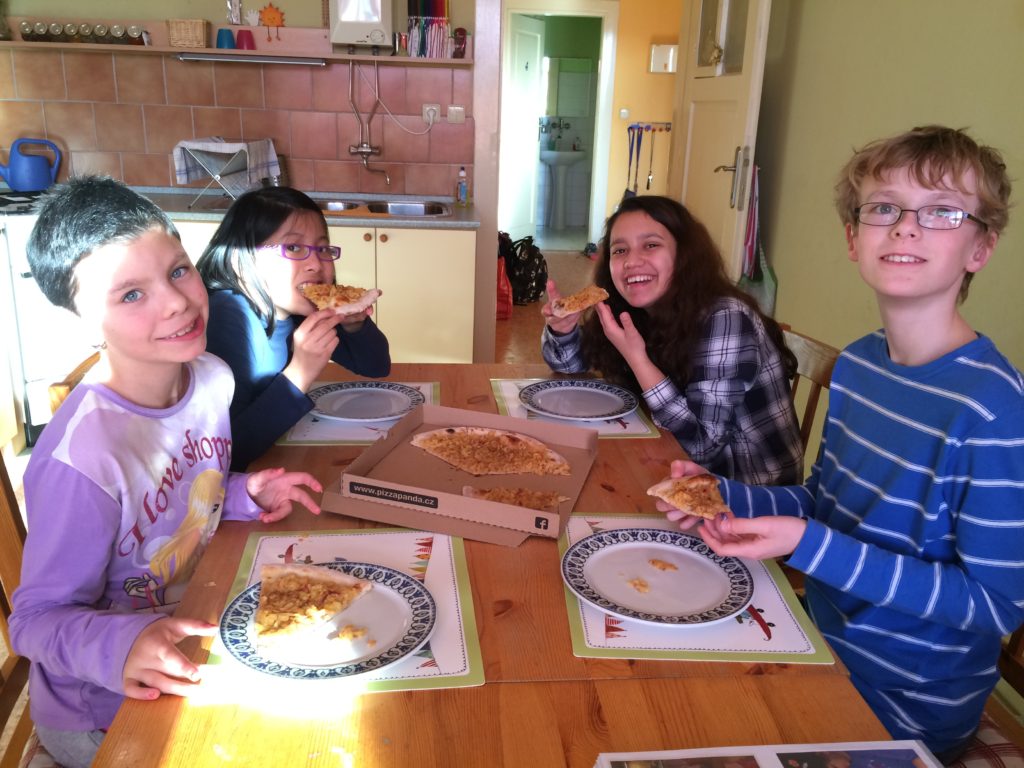The school dormitory provides educational care and accommodation to deaf and hard of hearing students of different ages.

The dormitory is located in a four-storey building next to the main building and is an integral part of the campus. The dormitory is connected with the school building by a corridor with student lockers, and a large room called Krček. This solution allows pupils to move around the school and dormitory without having to leave the buildings.
The dormitory and all school buildings are secured against the entry by unauthorized persons. The comfort and safety of our students is very important to us.
Operation and Schedule of the Dormitory
The educational process and extracurricular activity of students in the dormitory takes place under the guidance of hearing and deaf educators and assistant educators (night educators). The educator creates a daily program with regard to the educational plan and the fulfilment of the students´ obligations, taking into account the wishes of the students.
The schedule of the dormitory is differentiated according to the age and health of individual students. They are divided into smaller groups. Each group is cared for by one educator. All groups have their own daily schedule and specific program. Groups are actively involved in the shaping of their daily program.
By focusing on these activities of the dormitory, we place emphasis on strengthening the autonomy and responsibility of students and systematic development of skills and habits, which in turn will allow them to participate fully in society.
Accommodation and Meals
Students are accommodated in apartment areas. The apartment area consists of two rooms and a clubhouse. Rooms are double or triple occupancy. The apartment area is also equipped with shared bathrooms and toilets. The clubhouse, which also serves the educators, is used by pupils for active rest. The basic amenities of each room are beds, wardrobes, desks and chairs. The clubhouse is equipped with a TV, a DVD player, and comfortable furniture. Board games, and art materials are stored in the clubhouse cabinets. Each educational group has an assigned clubhouse, in which students with a tutor fulfill the long-term and short-term goals of the educational group. Students study and do homework here. The educator can also conduct individual interviews or educational discussions with students.
Students’ meals are provided by the school cafeteria (including breakfast and dinner). Students can warm up or prepare food, tea or coffee in the kitchens of the dormitory.
Internet access (WIFI) is available to students. In accordance with the school’s security policy, content is filtered and students do not have access to inappropriate content.
Leisure Time
Students can spend their free time in their rooms or use the entire campus according to their age and interest. On the campus there is an equipped workout gym, fitness room, an outdoor playground, a computer room, a library and a ceramic workshop. With the support of pedagogical staff, students can develop their skills, hobbies and talents in a number of areas.

Students have the opportunity to participate in a number of activities offered outside the school premises. It is mainly swimming in the city swimming pool and also skating at the winter stadium. Travel activities in the vicinity of the school can be practiced all year round. All activities are very easily accessible by public transport.
We strive to support our students in a universal way and open up new opportunities for them. We inform them about activities and interesting after school activities organized by the surrounding schools and within the city of Hradec Králové.
Apartment Apple 1 and Apple 2
As part of the alternative housing project “We live at home and live among you”, the school, in cooperation with the Municipality of Hradec Králové, operates two apartments for children in the center of Hradec Králové – in Střelecká Street and in Divišova Street (Apartment Jablíčko 1 and Jablíčko 2).

Students staying in the Apple Apartments leave the school premises together with the governess. As a rule, they go to the apartment by public transport. Their daily routine is the same as that in a normal family environment. They learn to be independent, manage everyday situations and participate in the usual running of the household – grocery shopping, preparation of simple meals, helping with cleaning, etc. This encourages children’s social learning in the natural environment.
In their free time, students integrate into society or develop their interests. They do creative projects, play social games, watch TV, play with toys, read books, etc. They also use the opportunity to attend extracurricular activities at school.
